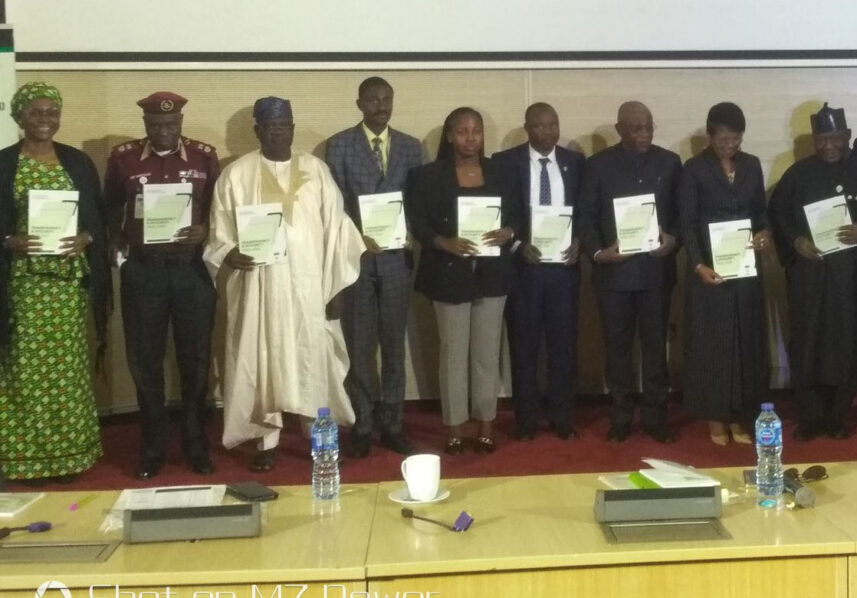 Findings from the 2024 Transparency and Integrity Index (TII) have ranked the National Oil Spill Detection and Response Agency (NOSDRA) and the Nigerian Investment Promotion Commission (NIPC) above Nigeria’s two leading anti-corruption agencies, the Economic and Financial Crimes Commission (EFCC) and the Independent Corrupt Practices and Other Related Offences Commission (ICPC).
Findings from the 2024 Transparency and Integrity Index (TII) have ranked the National Oil Spill Detection and Response Agency (NOSDRA) and the Nigerian Investment Promotion Commission (NIPC) above Nigeria’s two leading anti-corruption agencies, the Economic and Financial Crimes Commission (EFCC) and the Independent Corrupt Practices and Other Related Offences Commission (ICPC).
The study was conducted by the Bureau of Public Service Reforms (BPSR), in collaboration with the Centre for Fiscal Transparency and Public Integrity (CeFTPI) to promote transparency and accountability initiatives across public institutions.
While the highest score achieved in 2024, 77.92 percent, is higher than that of 2023, which stood at 72.26 percent, only the first two ranked institutions, the NOSDRA and NIPC, had excellent scores. The ICPC and the EFCC scored 24.86 percent and 8.00 percent to sit at 19th and 337th positions, respectively.
According to the findings presented by the Secretary to the Government of the Federation (SGF), Sen. George Akume, while NOSDRA emerged as the top performer with a total score of 77.92 percent, the NIPC followed closely in the 2nd position with a notable score of 71.53 percent.
According to the report, while the Development Bank of Nigeria (DBN) holds the 3rd position with a score of 60.17 percent, the Nigerian Institute of Advanced Legal Studies (NIALS) claimed the 4th spot with a score of 44.93 percent, and the Bank of Industry (BOI) holds the 5th place with a score of 39.43 percent.
The Nigerian Deposit Insurance Corporation (NDIC), according to the report, secured the 6th position with a score of 37.98 percent, while the Nigerian Electricity Regulatory Commission (NERC) occupied the 7th position with a score of 37.24 percent.
Also, the Tertiary Education Trust Fund (TETFUND) occupied the 8th position with a score of 34.64 percent, while the Central Bank of Nigeria (CBN) came 9th with a score of 32.79 percent, and the Nigeria Export-Import (NEXIM) Bank achieved the 10th rank with a score of 32.00 percent.
Further analysis revealed that a total of one hundred and fifty-one institutions, representing 195 of the total institutions assessed, scored between 8.00 and 0.31 percent, which includes Abubakar Tafawa Balewa University, Bauchi, Auchi Polytechnic, Edo, Gurara Dam Management Agency, Ministry of Petroleum, National Defence College, National Hospital, National Industrial Court, National Mathematical Centre, Pharmacy Council of Nigeria, Voice of Nigeria, Office of the Head of the Civil Service, Federal Medical Centre, and the Nigerian Defence Academy, Kaduna, among others.
Meanwhile, 26 institutions did not conform to the variables used in assessing the institution, some of which are: Ministry of Mines and Power, FCE Okene, National Board for Arabic and Islamic Studies, Federal College of Forestry and Mechanization, Afaka, Kaduna, Nigerian Coal Corporation, Office of the Accountant General of the Federation, and Office of the Secretary General of the Federation, among others.
In general, the report revealed a downward slide from the improvement in the performance of institutions in 2024 compared to 2023.
Speaking, CeFTPI Executive Director, Dr. Umar Yakubu, explained that the TII is geared towards assessing the openness and transparency of public institutions by evaluating the publication of vital information relating to good governance that is statutorily supposed to be within the public domain on the websites and portals of public institutions.
“Public institutions are statutorily mandated to publicize diverse classes of information regarding their activities, in line with the applicable legal framework guiding their operations.
“The project aims to evaluate the publication of information that is statutorily supposed to be within the public domain. This involves information on budgeting, audit, procurement, recruitment, and utilization of tools that aid the engagement of citizens.
“This initiative will assess the compliance of public institutions with national laws, policies, and guidelines, and other international agreements to which Nigeria has made commitments,” he added.






